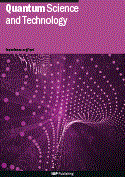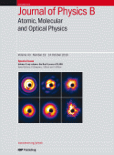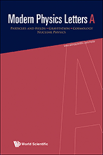
QUANTUM INFORMATION & COMPUTATION
Scope & Guideline
Connecting Minds in Quantum Information and Computing
Introduction
Aims and Scopes
- Quantum Algorithms and Complexity:
The journal publishes research on the design and analysis of quantum algorithms, exploring their computational complexity and efficiency compared to classical counterparts. - Quantum Communication and Cryptography:
Research in this area includes protocols for secure communication, quantum key distribution, and the study of quantum channels and their properties. - Quantum Computing Theory and Foundations:
Papers often focus on the theoretical underpinnings of quantum mechanics as they relate to computation, including quantum states, entanglement, and non-locality. - Quantum Machine Learning and Data Processing:
This scope includes studies on integrating quantum computing with machine learning techniques, exploring how quantum methods can improve data analysis and processing. - Quantum Control and Dynamics:
Research on controlling quantum systems and understanding their dynamics under various conditions is a significant focus, including noise analysis and fault tolerance. - Quantum Information Theory:
This includes the study of quantum states, entropy, and measures of quantum information, along with their implications for quantum computing and communication.
Trending and Emerging
- Quantum Software Development:
Recent publications highlight the development of software tools and frameworks specifically designed for quantum computing, addressing the need for practical applications and user-friendly interfaces. - Quantum Machine Learning:
There is a growing trend in exploring the intersection of quantum computing and machine learning, with researchers investigating how quantum algorithms can enhance learning processes. - Quantum Security Protocols:
A significant increase in research on quantum cryptography and secure communication protocols underlines the importance of safeguarding information in a quantum context. - Hybrid Quantum-Classical Systems:
Emerging interest in systems that combine quantum and classical computing paradigms reflects the practical challenges of current quantum technology and the need for integration. - Quantum Error Correction and Fault Tolerance:
As quantum technologies advance, research focusing on error correction techniques and strategies for achieving fault tolerance in quantum systems has become increasingly critical.
Declining or Waning
- Classical Simulation of Quantum Systems:
There seems to be a decreasing number of papers addressing classical algorithms for simulating quantum systems, possibly due to the shifting focus towards more practical quantum computing applications. - Basic Quantum Mechanics Principles:
Research that strictly adheres to foundational aspects of quantum mechanics without direct relevance to computation or information processing appears to be declining. - Quantum Teleportation Techniques:
Although still an important concept, specific techniques and studies on quantum teleportation have seen a reduction in frequency, as the focus shifts to more practical applications of quantum technologies.
Similar Journals

npj Quantum Information
Pioneering insights in interdisciplinary quantum studies.npj Quantum Information is a premier open-access journal published by NATURE PORTFOLIO, focusing on advancing the interdisciplinary field of quantum information science. First launched in 2015, the journal has rapidly established itself as a leading platform for innovative research, reflected in its impressive Q1 category rankings across multiple fields, including Computational Theory and Mathematics, Computer Networks and Communications, and Statistical and Nonlinear Physics. With an emphasis on publishing high-quality research, npj Quantum Information aims to disseminate pivotal findings that shape the future of quantum technologies and their applications. Its open-access model further enhances the accessibility of cutting-edge scholarly work, fostering collaboration and knowledge sharing among researchers, professionals, and students worldwide. With its commitment to excellence, the journal plays a crucial role in the intellectual landscape of quantum science, inviting contributions that push the boundaries of understanding and innovation.

Quantum Science and Technology
Exploring the Cutting Edge of Quantum ScienceQuantum Science and Technology is an esteemed academic journal published by IOP Publishing Ltd, specializing in the cutting-edge fields of quantum physics and technology. With a strong emphasis on innovation, the journal serves as a vital platform for researchers, professionals, and students engaged in Atomic and Molecular Physics, Electrical Engineering, and Materials Science. Since its inception in 2016, the journal has rapidly ascended to prominence, achieving Q1 rankings across multiple categories in 2023, reflecting its high impact and influence in the global scientific community. The journal is recognized for its rigorous peer-review process and commitment to disseminating groundbreaking research that pushes the frontiers of quantum science. Although it is currently not open access, the journal remains a pivotal resource for those seeking to stay at the forefront of developments in quantum technology and its applications. As part of its objectives, Quantum Science and Technology aims to connect diverse scholarly perspectives, fostering collaboration and knowledge exchange that can drive forward the quantum field.

JOURNAL OF PHYSICS B-ATOMIC MOLECULAR AND OPTICAL PHYSICS
Exploring the Frontiers of Atomic and Molecular PhysicsJOURNAL OF PHYSICS B-ATOMIC MOLECULAR AND OPTICAL PHYSICS, published by IOP Publishing Ltd, stands as a key platform within the fields of atomic, molecular, and optical physics. With an impressive history spanning from 1988 to 2024, this journal is recognized for its high-quality research contributions, holding a Q2 ranking in both Atomic and Molecular Physics and Optics, and Condensed Matter Physics, as of 2023. While not an open-access journal, it continues to attract a broad readership and submissions due to its commitment to disseminating knowledge that is at the forefront of contemporary physics research. The journal's ISSN 0953-4075 and E-ISSN 1361-6455 signal its accessibility and relevance in academic discourse. As researchers, professionals, and students delve into the intricate phenomena of quantum mechanics and photonics, they will find pivotal studies and insights within these pages, reinforcing JOURNAL OF PHYSICS B's stature as an esteemed resource in the ever-evolving landscape of physics.

Quantum Studies-Mathematics and Foundations
Advancing the frontiers of quantum mathematics.Quantum Studies-Mathematics and Foundations, published by SPRINGER, is an esteemed academic journal dedicated to advancing the field of quantum theories by providing a platform for the intersection of mathematics, physics, and foundational principles. Established in 2014, the journal has garnered a respectable impact factor within the academic community, reflective of its commitment to quality research, acknowledged in its Q3 ranking in both Atomic and Molecular Physics and Mathematical Physics for 2023. With a focus on groundbreaking studies that explore the subtleties of quantum mechanics and its mathematical underpinnings, the journal aims to foster innovative research and contribute to the discourse among researchers, professionals, and students alike. Although the journal operates on a non-open access model, it provides invaluable insights that bridge theoretical frameworks with practical applications in the quantum realm. The journal is located in a prime academic hub in Switzerland, making it a significant contributor to the global dialogue in physics and mathematics.

INTERNATIONAL JOURNAL OF THEORETICAL PHYSICS
Charting New Territories in Theoretical PhysicsInternational Journal of Theoretical Physics is a premier academic journal dedicated to the advancement of knowledge in the fields of theoretical physics and mathematics. Published by Springer/Plenum Publishers, this esteemed journal has been a vital platform for researchers since its inception in 1968. With an impressive track record and an emphasis on high-quality, innovative research, the journal currently ranks in the third quartile (Q3) in both the Mathematics (Miscellaneous) and Physics and Astronomy (Miscellaneous) categories as of 2023. While the journal is not open access, it offers accessible subscription options for institutions and individuals. The International Journal of Theoretical Physics serves as an essential resource for scholars and practitioners looking to deepen their understanding and contribute to the evolving landscape of theoretical research, making it a key player in nurturing academic discourse and fostering collaboration in its field.

Quantum
Exploring the limitless potential of optics and quantum physics.Quantum, an esteemed Open Access journal published by the Verein Förderung Open Access Publizierens Quantenwissenschaft, serves as a pivotal platform for the dissemination of groundbreaking research in the fields of atomic and molecular physics, and optics. Since its inception in 2017, Quantum has emerged as a leader in the academic community, boasting an impressive impact factor within the top quartile (Q1) in its categories, ranking #6 out of 81 in Physics and Astronomy (miscellaneous) and #35 out of 224 in Atomic and Molecular Physics, and Optics in 2023. With its global reach, based in Vienna, Austria, Quantum is dedicated to promoting innovative research and fostering collaboration among scientists, researchers, and students alike. The journal encourages unrestricted access to high-quality publications, ensuring that vital advancements in quantum science are available to all, thereby facilitating knowledge exchange and accelerating scientific progress. Explore the cutting-edge developments at the forefront of quantum studies and contribute to a vibrant scholarly community.

PRX Quantum
Unlocking the potential of quantum science.PRX Quantum is a premier open-access journal published by the American Physical Society, dedicated to advancing the field of quantum studies. Launched in 2020, this journal serves as a vital platform for the dissemination of high-quality research across a diverse range of interconnected disciplines, including applied mathematics, computer science, and electronic engineering, as evidenced by its impressive rankings in the 2023 Scopus categories. With a remarkable impact factor and holding a top quartile position in multiple areas, PRX Quantum is not only pivotal for researchers engaged in quantum physics and related areas but also for professionals and students seeking to stay at the forefront of quantum technology and material science. Additionally, as an open-access journal, it champions the free distribution of knowledge, allowing for wider accessibility and engagement within the global research community. With a commitment to nurturing innovation and interdisciplinary collaboration, PRX Quantum is an indispensable resource for anyone interested in the evolving landscape of quantum science.

Entropy
Fostering innovation through open dialogue and research.Entropy is an esteemed open-access journal published by MDPI since 1999, dedicated to the dissemination of research in the fields of Electrical and Electronic Engineering, Information Systems, Mathematical Physics, and Physics and Astronomy. Based in Switzerland, Entropy has garnered significant recognition, achieving a Q2 category ranking across multiple disciplines in 2023, including a commendable 90th percentile rank in Mathematical Physics. The journal not only embodies a commitment to high-quality scholarly content but also serves as a platform for interdisciplinary dialogue among researchers and practitioners. With a robust e-ISSN of 1099-4300, it offers easily accessible publications that encourage collaborations and innovations in tackling complex scientific problems. Researchers, students, and professionals alike will find valuable insights through its curated articles, making Entropy an essential resource for advancing knowledge in its respective fields.

MODERN PHYSICS LETTERS A
Bridging Theories and Discoveries in PhysicsMODERN PHYSICS LETTERS A, published by World Scientific Publishing Co Pte Ltd, is a distinguished journal in the field of physics that serves as a pivotal platform for researchers, professionals, and students alike. With ISSN 0217-7323 and E-ISSN 1793-6632, the journal has gained international acclaim for its contributions to Astronomy and Astrophysics as well as Nuclear and High Energy Physics. The journal is ranked in Q3 for both Astronomy and Astrophysics and Nuclear and High Energy Physics, showcasing its relevance in these areas, while also achieving a Q2 ranking in the broader category of Physics and Astronomy (miscellaneous). Spanning from 1996 to 2024, MODERN PHYSICS LETTERS A promotes open dialogue and dissemination of pioneering research findings and innovative theories. While the journal operates without an open access option, its rich content is easily accessible through various academic databases, ensuring that vital research is shared widely among the scientific community. Situated in Singapore, this journal plays an essential role in the continuous advancement of the physics discipline, fostering collaboration and knowledge sharing among global researchers.

Physical Review Research
Bridging ideas and innovation in physics and astronomy.Physical Review Research, published by the American Physical Society, is a premier open access journal dedicated to the dissemination of high-quality research across all areas of physics and astronomy. Since its inception in 2019, this journal has quickly established itself as a vital platform for researchers, achieving a prestigious Q1 ranking in the dynamics of Physics and Astronomy (miscellaneous) and holding a commendable position in the Scopus Rankings with a rank of #29 out of 243, placing it in the 88th percentile. With the commitment to fostering scientific collaboration and transparency, Physical Review Research offers unrestricted access to valuable findings, enabling researchers, professionals, and students alike to engage with cutting-edge contributions in general physics and astronomy. As it converges into its forthcoming years of publication, the journal remains dedicated to showcasing rigorous research and innovative ideas that drive the field forward.